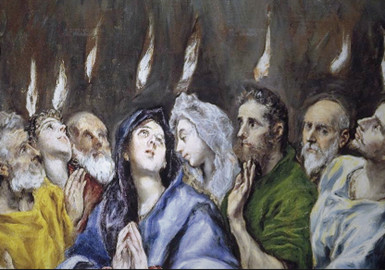For Fifty Days we have lived and breathed the miracle of Easter/Pentecost. Hopefully we have understood better than ever before that this is not just a spectacular episode of Salvation History that happened a long time ago but that it still touches us all with its reverberations. Throughout the Easter Season, we have listened to John's account of Jesus' final discourse to his apostles at the Last Supper reminding them: "I have told you this while I am with you. The Advocate, the Holy Spirit, whom the Father will send in my name, will teach you everything and remind you of all that I told you." For John the connection between the Resurrection of Jesus and the outpouring of the Spirit was so intimately connected that his account of Pentecost occurs on Easter Sunday night.
" Peace be with you." When he had said this, he showed them his hands and his side. The disciples rejoiced when they saw the Lord. Jesus said to them again, "Peace be with you. As the Father has sent me, so I send you." And when he had said this, he breathed on them and said to them, "Receive the Holy Spirit. Whose sins you forgive are forgiven them, and whose sins you retain are retained." (Jn 20:19-23)
Peace be with you." When he had said this, he showed them his hands and his side. The disciples rejoiced when they saw the Lord. Jesus said to them again, "Peace be with you. As the Father has sent me, so I send you." And when he had said this, he breathed on them and said to them, "Receive the Holy Spirit. Whose sins you forgive are forgiven them, and whose sins you retain are retained." (Jn 20:19-23)
The first Pentecost brought excitement, mystery and fear to the Christian community. It was, in fact, the completion of their sense of identity and clarified their mission. Most importantly, it filled them with power, assured them of the strength they would need to witness to the Gospel, to overcome the spirit of the world, to drive away the darkness of sin and evil.
In the experience of this indwelling Spirit, the first Christians discovered joy and peace. They would find that the Spirit provided for all of their needs. It satisfied their deepest hungers and longings. It gave them a reason to live and a reason to die. It filled them with abiding hope, and assured them of final victory and fullness of life with the Risen Lord.
But the passionate enthusiasm brought about by the Spirit did not remove human frailty or prejudice.
Discerning where the Spirit leads us has always been a difficult task from our Church's earliest beginnings right up to the present time, especially for a pilgrim people in a pilgrim Church. For so long we have been content with viewing our faith as a kind of spectator sport. It has now become a contact sport, and we find ourselves right in the middle of things.
The Christian community has always seen itself as the Spirit-guided bearer of the Word of Salvation. For us as a people of faith, Easter/Pentecost is now. It is the continuing invitation from our God for an ongoing, ever new encounter with Him and with others.
We have seen the marks of the nails in the hands and feet of Jesus in the suffering of those who live their lives in oppression, through the trial and pain of those around us, and through the insult and prejudice that we sometimes feel in our own lives because of our faith. If we listen closely we can hear the voice of Jesus offering us peace. We will learn that we, too, are sent by the Spirit to bring forgiveness, to bring comfort and joy, and to proclaim that peace, which we, ourselves, have so graciously been given.
So Pentecost is not just a celebratory feast. It is the continuing miracle of God's love poured out into the hearts of believers. It is the abiding power source of Gospel living.
Jesus' life points the way by which we enter into what's really real. The Spirit gives us the vision to realize what is most important in our lives and what our resposibilities truly are. The life, death and resurrection of Jesus is the invitation. Pentecost is our response.





